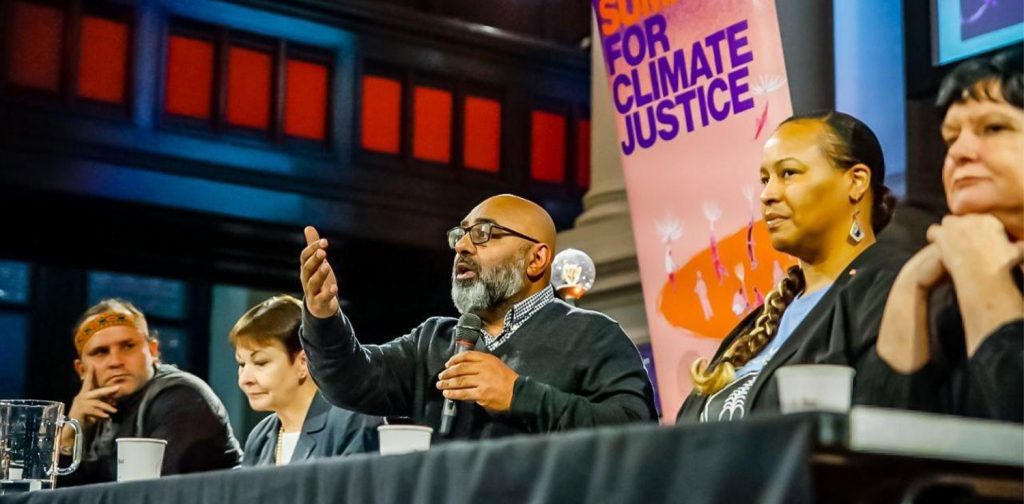An Urgency for Climate Justice Created the People’s Summit

Our Time Is Now - Asad Rehman, | Photo by: Oliver Kornblihtt
COP26 is still underway in Glasgow, UK. This Conference of the Parties brings together around 120 world leaders for the ‘last, best chance’ to keep the 1.5℃ goal from the Paris Agreement alive. However, many across the globe are skeptical of this process, and they feel the need to do more. People’s Summit for Climate Justice is the manifestation of that.
Hosted by COP26 Coalition, the People’s Summit ran from November 7th – 10th with indigenous, frontline, and Global South communities at the front and center. This summit held over 200 free panels, workshops, films, performances, and games in-person and digitally. The first day alone garnered over 12,000 registrations.
The in-person sessions were planned according to the COVID-19 safety guidelines as regulated by the NHS despite the global vaccine inequality. This summit was also multilingual. An app called interactio streamed the simultaneous translation of contributions from speakers in various languages.
The sessions covered a multitude of topics from perspectives and outlooks often absent from COP26, such as “Covering the climate crisis: Journalism’s role in protecting our planet”, which happened digitally on 11/8 in English, Spanish, French and Portuguese. In-person sessions included “Indigenous Traditional Knowledge and Nature-Based Solutions”, “From Crisis to Justice: How do we win a Global Green New Deal?”, and “Changing workplaces, changing jobs: organizing for power in unionized workplaces”.
The COP26 Coalition is a civil society coalition of groups and individuals based in the UK. It mobilizes around climate justice during COP26. The Coalition believes that climate justice will not be delivered by world leaders or corporations. It calls for collective action, solidarity, and coordination from local and international communities.
In summary, their demands are:
1. No to Fossil Fuels, Net-Zero, and False Solutions
Aiming for Real Zero instead of Net-Zero. Most of the world’s movement today targets Net-Zero, in which parties seek carbon offsets while continuing making pollution and emissions. Aiming for Real Zero means no new fossil fuel investments and infrastructure, carbon markets, and risky, unproven technologies.
2. Rewire the System
Rewiring the system so it addresses injustices, poverty, and inequalities through a Worker-led Justice Transition. The transformation cannot be built in the Global North with resource extraction and human rights abuses in the Global South.
3. Reparations and Redistribution to Indigenous Communities and The Global South
Addressing the loss of lives, livelihoods, and ecosystems of the Indigenous Peoples, frontline communities, and the Global South because these communities continue to pay the price for the climate crisis while the Global North profits. This includes canceling the debts of the Global South and providing reparations for the loss and damage.
Editor: Marlis Afridah

Co-create positive impact for people and the planet.
Amidst today’s increasingly complex global challenges, equipping yourself, team, and communities with interdisciplinary and cross-sectoral insights on sustainability-related issues and sustainable development is no longer optional — it is a strategic necessity to stay ahead and stay relevant.

Nazalea Kusuma
Naz is the Manager of International Digital Publications at Green Network Asia. She is an experienced and passionate writer, editor, proofreader, translator, and creative designer with over a decade of portfolio. Her history of living in multiple areas across Southeast Asia and studying Urban and Regional Planning exposed her to diverse peoples and cultures, enriching her perspectives and sharpening her intersectionality mindset in her storytelling and advocacy on sustainability-related issues and sustainable development.


 Indian Gig Workers Push Back Against 10-Minute Delivery Service Strain
Indian Gig Workers Push Back Against 10-Minute Delivery Service Strain  Call for Governance: Grassroots Initiatives Look to Scale Efforts to Conserve Depleting Groundwater
Call for Governance: Grassroots Initiatives Look to Scale Efforts to Conserve Depleting Groundwater  Integrating Environment, Climate Change, and Sustainability Issues into Education Systems
Integrating Environment, Climate Change, and Sustainability Issues into Education Systems  Finally Enforced: Understanding the UN High Seas Treaty
Finally Enforced: Understanding the UN High Seas Treaty  Risks and Opportunities of Submarine Communication Cables for Sustainable Development
Risks and Opportunities of Submarine Communication Cables for Sustainable Development  Rising Attacks and Violence Against Land and Environmental Defenders
Rising Attacks and Violence Against Land and Environmental Defenders